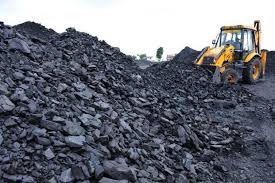Environment stakeholders urge FG to stop issuing coal mining licenses

Stakeholders in Nigeria’s Environment sector on Friday called on the Federal Government to stop further issuance of coal mining licenses to mining companies.
Mr. David Michael, Executive Director, Global Initiative for Food Security and Ecosystem Preservation (GIFSEP) an NGO, discloses this at a press conference in Abuja.
Michael says that the essence of the meeting is in commemoration of 2020 International Day of Climate Action with the theme, “Cooperatives for Climate Action’’.
He says that Sept. 25 has been declared a Global Day of Climate Action to coincide with the UN Climate week.
Michael says that GIFSEP, Climate and Sustainable Development Network (CSDevNet) in collaboration with the Nigerian Civil Society Framework on Paris Agreement and Sustainable Development Goals (NCSFPAS) are all behind the call.
He recalls that a study commissioned by 350 organizations in 2019, about the status of coal mining in the country has shown that coal mining in Kogi, Benue and Gombe states has led to extensive environmental degradation.
According to Michael, the stakeholders are calling on the government to respect the provision of its Nationally Determined Contributions (NDCs) to the Paris Agreement and stop further issuance of coal mining licenses.
“The mining has led to the contamination of air, water and soil with severe effects on the health of local communities.
“The coal miners fingered in the study are Dangote Cement, ETA Zuma`s Zuma 828 Coal Ltd and Lafarge`s (Ashaka) Cement. More recently, Owukpa Consolidated Mines Ltd has entered into the fray.
“The mentioned companies, despite stating lofty green and environmental sustainability positions on their websites and investor documents including annual and sustainability reports, they continue with the practice.
“The companies have totally disregarded the health and livelihoods of local communities and effects of their activities on the global climate crisis,’’ he said.
Michael says the stakeholders demand that the Federal Ministry of Environment should carry out an environmental and social impact assessment on all the coal mining sites in the country.
He advocates that the Ministry of Mines and steel should urgently review all the community development agreements signed between the coal mining communities and mining companies.
“Government should accelerate the national plans to a rapid, just transition towards 100 per cent renewable energy for all Nigerians.
“Government should as well abide by their commitment to the Paris Agreement which requires phased reduction of greenhouse gases such as coal fired plants.
“All mining operations in the country undertaken by multinational companies should adhere to the UN guiding principle on business and human rights,’’ Michael said.
In her own address, Miss Ekele Ugwah, from CSDevNet, a civil organization, discloses that coal mining activities lead to extensive environmental degradation, water, air, and soil pollution.
Ugwah says that the activities have caused contamination of water and brought metals into the soil which is supposed to be used for agricultural production.
“This mining activity has led to adverse effects on the health and livelihood of the communities living in the three mentioned states,’’ Ugwah said.
She alleges that the companies engaged in the activities are benefiting greatly from the goodwill of the local communities yet, they refuse to comply with the community development agreements they entered with the communities.
Ugwah discloses that the agreements, when reviewed, show that they are heavily skewed against the local people.
Mr. Pius Oko, another stakeholder from CSDevNet says in his address that, the aim of Nigeria being a party to the Paris Agreement is to reduce greenhouse gas emissions in the country.
Oko notes that the government has placed a high priority on utilizing coal to increase the county`s electricity generating capacity.
He says that recently the Ministry of Mines and Steel Development announced that it is collaborating with the Ministry of Power, and Ministry of Works and Housing, to increase power generation.
Oko recalls that the power generation is expected to include 30 per cent coal in its power mix.
According to him, Nigeria holds large coal deposits from the East to the North, estimated to be at least 2 billion metric tonnes.
“The Federal Government goals are to revitalize the coal mining industry and expand power generation by attracting companies to exploit these large coal deposits,’’ Oko said.
